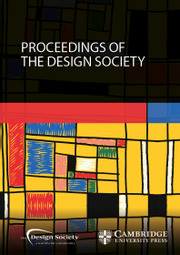Article contents
THE REPRESENTATION-USAGE-IMPACT (RUI) METHOD TO BETTER FRAME THE POTENTIAL SOCIAL IMPACTS OF A HIGHLY DISRUPTIVE PRODUCT—APPLICATION TO THE AUTONOMOUS VEHICLE
Published online by Cambridge University Press: 19 June 2023
Abstract
Innovative products can be highly prospective and apt to disrupt usages profoundly. They can lead to multiple long-term social impacts influencing people's way of life and behaviour. So it is necessary to anticipate them without delay. Due to high uncertainty, designers may face the problem that conventional user-centred methods, which assess design performances from today's users, are not adapted. We think sociologists can help characterise the likely social impacts of future products. So we propose an original framework called the Representation-Usage-Impact (RUI) method to stimulate sociologists' projection and capture relevant knowledge about probable social impacts. The method includes a database structure encoding the knowledge of sociologists for further use in the design process. Its goal is to help designers avoid making choices today that may be regretted in decades. We illustrate the method and its process with the design of autonomous vehicle scenarios, as it will likely bring many new usages in the future. As the method is still under construction, we present an intermediate validation step involving sociologists. The first results suggest that the method might be a safeguard for the design of disruptive products.
- Type
- Article
- Information
- Creative Commons
- This is an Open Access article, distributed under the terms of the Creative Commons Attribution-NonCommercial-NoDerivatives licence (http://creativecommons.org/licenses/by-nc-nd/4.0/), which permits non-commercial re-use, distribution, and reproduction in any medium, provided the original work is unaltered and is properly cited. The written permission of Cambridge University Press must be obtained for commercial re-use or in order to create a derivative work.
- Copyright
- The Author(s), 2023. Published by Cambridge University Press
References
- 1
- Cited by


